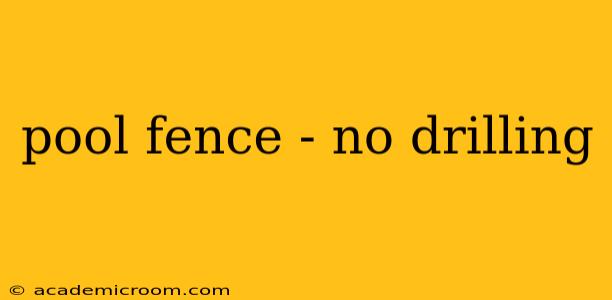Protecting your loved ones from accidental pool entries is paramount, and a sturdy pool fence is your first line of defense. But the thought of drilling holes in your deck or patio can be daunting. Fortunately, there are numerous no-drill pool fence installation options available, offering a blend of safety and aesthetic appeal without compromising your property's integrity. This comprehensive guide explores the various no-drill methods, helping you choose the best solution for your pool and home.
What are the Different Types of No-Drill Pool Fencing?
Several innovative pool fence systems bypass the need for drilling, offering a range of styles and materials to complement any backyard setting. Let's explore the most common options:
-
Clamp-On Systems: These fences utilize sturdy clamps or brackets that grip existing structures like decks, patios, or walls. They are generally easy to install and remove, making them ideal for renters or those who want flexibility. The clamps are often designed to be adjustable to fit various thicknesses of materials.
-
Weight-Based Systems: These fences rely on their own weight and strategically placed bases for stability. The panels are often heavy-duty and designed to resist strong winds and accidental impacts. While they might not be as visually unobtrusive as other options, their strength and ease of installation are significant advantages.
-
Post-and-Panel Systems with Ground Sleeves: These systems utilize sleeves inserted into the ground instead of drilling into existing structures. This method works well for larger areas and provides a permanent, yet no-drill, solution. However, the depth of the sleeves will depend on soil conditions and local regulations.
-
Temporary Pool Fences: Suitable for shorter-term needs or rentals, these fences are lightweight and easy to assemble and disassemble. While they offer a level of safety, they may not be as robust as permanent options and are less suitable for areas with strong winds.
Is a No-Drill Pool Fence as Strong and Secure as a Drilled Fence?
This is a common concern. While drilled fences offer the most robust and permanent solution, many modern no-drill options are incredibly strong and secure. The key is choosing a high-quality system from a reputable manufacturer. Look for fences that meet or exceed relevant safety standards and are constructed from durable materials. Always check local building codes and regulations to ensure the chosen fence meets all requirements.
How Much Does a No-Drill Pool Fence Cost?
The cost varies greatly depending on the chosen type, materials, fence length, and any professional installation fees. Clamp-on systems tend to be more budget-friendly, while weight-based and post-and-panel systems may cost more. It's crucial to obtain multiple quotes from different suppliers to compare prices and features.
Can I Install a No-Drill Pool Fence Myself?
Many no-drill pool fences are designed for DIY installation. However, carefully read the manufacturer's instructions before beginning. Some systems are easier to install than others. If you're unsure about any aspect of the installation, it's always advisable to hire a professional installer to ensure the fence is installed correctly and safely. This is particularly important for more complex systems like post-and-panel designs with ground sleeves.
What are the Building Codes and Regulations for Pool Fencing?
Building codes and regulations regarding pool fencing vary by location. Before purchasing and installing any pool fence, check with your local authorities to understand the specific requirements for your area. These regulations often cover fence height, mesh size, gate latch mechanisms, and overall structural integrity. Non-compliance can result in fines or require you to remove and reinstall the fence.
Which No-Drill Pool Fence is Best for My Pool?
The ideal no-drill pool fence depends on your specific needs, budget, and the existing features of your property. Consider factors like the size of your pool area, the type of surrounding structures, the level of security required, and your DIY skills when making your decision. Consulting with a pool safety professional can provide valuable insights and guidance in selecting the most appropriate fence for your situation.
This guide provides a solid foundation for understanding the various options available when choosing a no-drill pool fence. Remember to always prioritize safety and adhere to local building regulations to ensure your pool area is a secure and enjoyable space for your family and guests.
